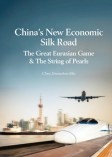Suzerainty Issues Hold back the West in Embracing China’s Belt and Road

The concept of “suzerainty”, whereby a dominant state controls the foreign relations of a vassal state, while at the same time allowing it sovereign authority in its internal affairs is hanging over the reluctance to sign up to China’s Belt and Road Initiative.
The Chinese have long stuck to the principal of suzerainty in their claims over Tibet, and have constantly pushed the concept as proof of their legitimate right to rule. That is now coming back as a sticking point on the “Memorandum of Understanding” presented by the Chinese to foreign governments interested in taking part in the Belt and Road Initiative. These agreements may contain references to the authority of Chinese courts in disputes, an issue I pointed out in the article: China Passes Belt & Road Trade Dispute Mechanism – But Who Will Have Final Say? and is further elaborated here: China to Set up Belt and Road Dispute Courts in Beijing, Xi’an, and Shenzhen.
This may signal that signing up to China’s Belt and Road MoU effectively eats into each of the nation’s abilities to govern their own laws – by passing the responsibility of handling trade disputes to Beijing. While that may not be a definition of suzerainty in itself, it is certainly a step in that direction. China’s Communist Party, meanwhile, maintain a very strong position on the issue, which includes references to “paying tribute” – a very wide ranging interpretation.
This could impact existing dispute mechanisms, such as the World Trade Organization’s own structure, which China is a signatory to. Claiming certain trade deals fall under a bilateral agreement between China and another country, with the dispute to be ultimately resolved in Beijing, may lead to all sorts of legal problems, let alone suzerainty claims. Foreign diplomats and government counsel responsible for negotiating such MoUs – which China regards as legally binding – would be well advised to examine what China means when referring to dispute resolution mechanisms and other bilateral “problem solving” instruments within them and what they have, or are being asked to agree to. What is often described as a “win-win” situation by China can often instead translate as meaning China wins twice. Caution is advised.
About Us
Chris Devonshire-Ellis is the Chairman of Dezan Shira & Associates and a Visiting Professor at Russia’s Higher School of Economics. The firm advises foreign Governments and multinational businesses on trade and investment into China and Asia. For more information please contact asia@dezshira.com or visit www.dezshira.com
 Related Reading:
Related Reading:
Silk Road and OBOR Business Intelligence
Dezan Shira & Associates´ Silk Road and OBOR investment brochure offers an introduction to the region and an overview of the services provided by the firm. It is Dezan Shira´s mission to guide investors through the Silk Road´s complex regulatory environment and assist with all aspects of establishing, maintaining and growing business operations in the region.
Establishing & Operating a Business in China 2018
China’s foreign investment landscaped changed significantly in 2017, where strategic investors will find that their options have broadened significantly. Establishing and Operating a Business in China 2018 is designed to explore the establishment procedures for the Representative Office (RO), and two types of Limited Liability Companies – the Wholly Foreign-owned Enterprise (WFOE) and the Sino-foreign Joint Venture (JV) – along with related business considerations that decision-makers should examine at the pre-investment, setup, and operational stages of the expansion cycle.
China’s New Economic Silk Road
This unique and currently only available study into the proposed Silk Road Economic Belt examines the institutional, financial and infrastructure projects that are currently underway and in the planning stage across the entire region. Covering over 60 countries, this book explores the regional reforms, potential problems, opportunities and longer term impact that the Silk Road will have upon Asia, Africa, the Middle East, Europe and the United States.








